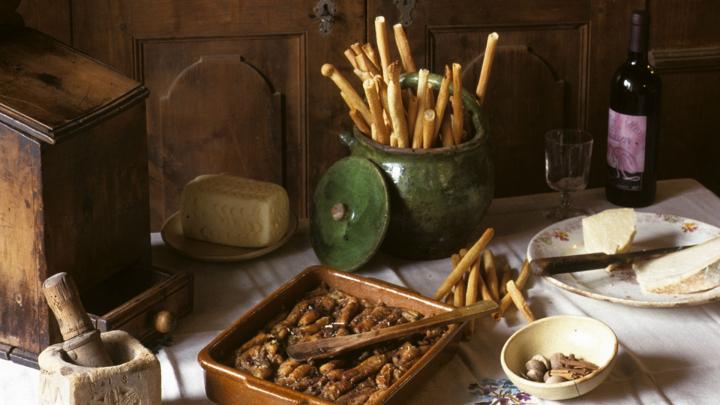If you want to use the traditional method of cooking, you must use copper "basins", i.e. flared casseroles suitable for placing on the embers of the fireplace; today they have been replaced by terracotta pots and the fireplace has been replaced by a normal source of heat: the best thing would be a wood-burning stove.
Line the bottom of the container with cabbage leaves, then form a layer of breadsticks (or sliced stale bread) and cover with a handful of fresh toma cubes, a few pieces of butter and a pinch of ground spices. Finish with another layer of breadsticks, toma and seasoning, until you reach the edge of the pan. Separately (even better the day before) make a broth, using chicken, pork bones (traditionally put in brine and preserved throughout the winter), pork meat, carrots, onions, celery stalks, leeks and sprigs of herbs. Carefully remove the fat from the broth. Cover the entire preparation with this rich broth. Cook on the embers of the fireplace, the stove or the hob, over a fairly gentle heat, without ever stirring. At the end of cooking, after about two hours, the breadsticks or bread must still be intact. Bring the soup to the table last, seasoning with bubbly butter flavoured with two tablespoons of whole spices.
Note: the name "barbèt" was and still is used to indicate the Waldensian reformed valleys of western Piedmont. The term "barba", which in popular language was used to indicate the uncle, a greatly respected member of the family hierarchy, was also assigned to the Waldensian preachers. Supa barbëtta is the most emblematic dish of these communities: it was prepared on special occasions - the Christmas holidays, Easter, the killing of the pig - and was originally made only with stale bread, replaced, from the second half of the nineteenth century, by breadsticks, which wealthy families went specifically to buy in Turin. The copper basins have been replaced by terracotta pots, called fojòt ("fujot") and pork bones in brine can be replaced with fresh bones.

